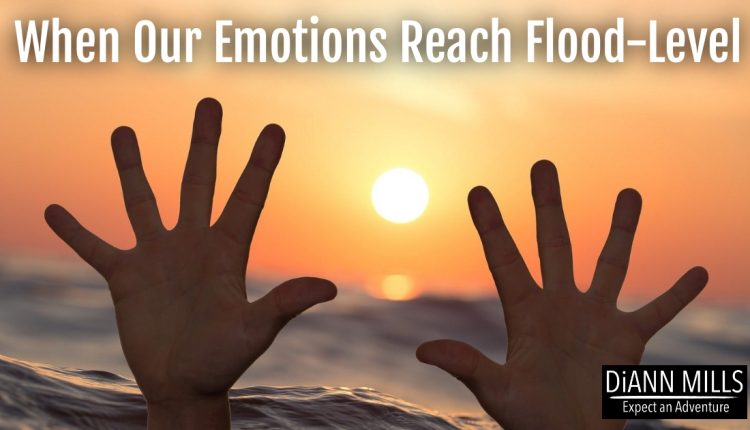By DiAnn Mills @DiAnnMills
We’ve all experienced overwhelming emotions when life’s happenings make us feel like we’re drowning in flood-level pressure, responsibilities, and daily challenges. The urge to give up and let the sea sweep us away tempts us. Too often, we forget that channeled stress helps us effectively problem-solve and meet deadlines.
We can learn to swim to higher ground and manage those aspects of life and people with authority and enthusiasm.
Factors contributing to flood-level emotions
- Taking on more work than time or logic allows
- Traumatic experiences such as a death, divorce, or betrayal
- Unmanageable stress
Recognize the symptoms of emotional overload
- Anxiety/fear
- Depression
- Exhaustion/fatigue
- Inability to make decisions
- Inability to sleep
- Isolation from others
- Loss of interest in our work, hobbies, and relationships
- Nausea, headache, colds, body aches of no explainable origin
- Weight gain or loss from poor eating habits
How flood-level emotions affect our relationships with others
- Breakup of family, friends, and work-related connections
- Extreme irritability
- Inability to communicate
- Lack of genuine concern for other’s welfare
- Manipulative tactics and bullying
- Skeptical to trust others
- Social skills suffer, causing family and friends to avoid us.
- Work productivity reduces as well as teamwork and information sharing
Coping strategies when emotions threaten to drown us
- Communicate with a trusted friend or a professional counselor when sad and depressing times attack us. Seeking support is one of the wisest steps we can take.
- Create by climbing onboard a lifeboat that allows us to use our imagination, skills, and talents to fashion something beautiful.
- Exercise to work off the unhealthy stress that increases our blood pressure and the potential of a heart attack.
- Journal those unwanted emotions, conversations, and frustrations. Don’t neglect past victories and successes to show you can overcome the problem.
- Learn from the past with the journal suggestion above. No doubt you have waded through these murky waters before and made it to the other side.
- Pray, and this should always be our first line of defense from the threat of high tide to calm sandy beaches. Do we know what brought on the stress? God is with us to guide and encourage our trials.
- Incorporate good health by eating nutritionally sound meals and snacks. If we want to be our best, then our bodies need the right fuel.
- Set boundaries with those who attempt to rob us of our time and patience. Pray through what we think is the issue before saying or doing something we regret later.
If you know a friend or loved one who is experiencing continuous overwhelmed emotions, reach out to them in sincere caring to see if the person is in a desperate situation.
When we recognize the signs, the damaging effects, and how to cope with flood-level emotions, we become physically, mentally, emotionally, and spiritually stronger.
Do you have a tip to help us manage emotional overload?

Disclaimer:
While the strategies outlined above can be helpful for managing overwhelming emotions, it’s essential to recognize that they may not be suitable for everyone or every situation. If you find yourself consistently struggling with your emotions to the point where it significantly impacts your daily life, relationships, or overall well-being, it’s crucial to seek professional guidance from a qualified therapist, counselor, or mental health professional.
Additionally, the information provided in this blog post is intended to offer support and guidance for coping with emotional challenges, but it is by no means a substitute for professional advice or treatment. Every individual’s experience with emotions and mental health is unique, and what works for one person may not work for another.
Please remember that seeking help is a sign of strength, not weakness. If you or someone you know is in crisis or experiencing thoughts of self-harm or suicide, please seek immediate assistance from a mental health hotline, emergency services, or a trusted healthcare provider.
Here are a few reputable online mental health hotlines and emergency services you can reference:
1 National Suicide Prevention Lifeline (USA):
- Website: https://suicidepreventionlifeline.org/
- Phone: 1-800-273-TALK (1-800-273-8255) (24/7 hotline)
2 Crisis Text Line (USA):
- Website: https://www.crisistextline.org/
- Text HOME to 741741 (24/7 crisis support via text message)
3 Samaritans (UK):
- Website: https://www.samaritans.org/
- Phone: 116 123 (24/7 hotline)
4 Kids Help Phone (Canada):
- Website: https://kidshelpphone.ca/
- Phone: 1-800-668-6868 (24/7 hotline)
5 Lifeline (Australia):
- Website: https://www.lifeline.org.au/
- Phone: 13 11 14 (24/7 hotline)
These organizations provide confidential support and assistance to individuals in crisis or experiencing mental health challenges.

